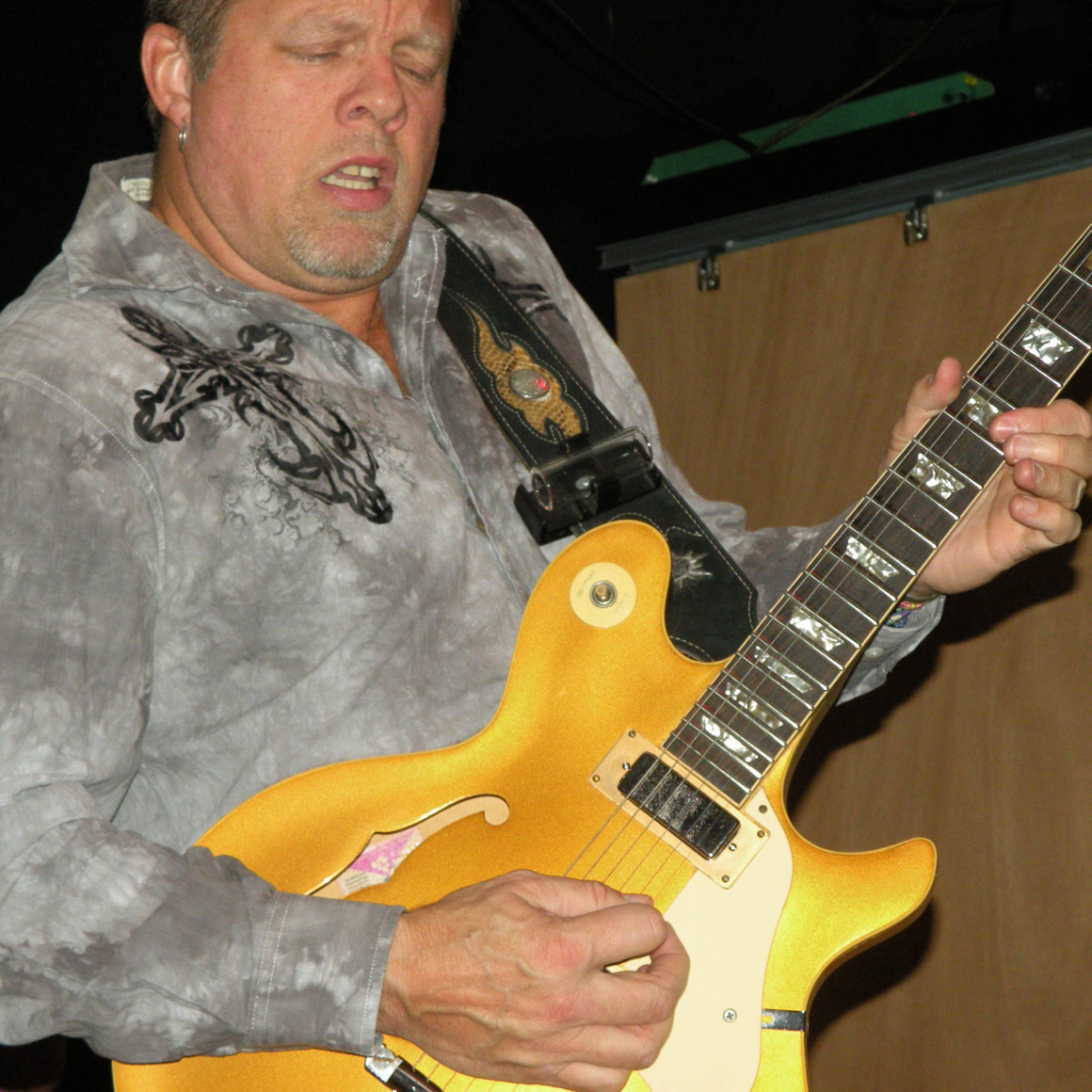
Guitarist Chris Fitz is changing with the times
From guitar slinger to singer/songwriter, Fitz has had to adapt his style and approach but he has always been rooted in the Blues.
by Art Simas
After a 27-year experiment of learning the guitar on his own in his mid-teens; doing the obligatory garage jam band thing with high school classmates; being a stellar athlete in baseball and football at Bowdoin College in Maine; working as a corporate sales representative in San Francisco; being totally absorbed into that city’s Blues scene that featured Albert Collins, Roomful of Blues, James Cotton, the Fabulous Thunderbirds, and scores more; then coming back east to dig clams on the Cape … Chris Fitz returned to his roots and settled in the Boston area, vowing to be a professional musician around 1992-93.
Once that was established, nothing was going to stop him. He was going to figure it out and how to make it work. His focus, then and now, on becoming a professional musician was as penetrating and determined as the stone-cold granite gaze of the Old Man of the Mountain in New Hampshire.
Now nearly 50, the multi-cross-country journey has finally come home – literally – to his living room. He can finally be that serious guy who gets paid for playing guitar, writing his own songs, performing with his own band, and teaching others who aspire to emulate his goals and passion to the never-ending art form called music.
After graduating from college, Fitz decided to take a one-way mountain bike trip to San Francisco to hook up with some friends from Bowdoin. He dipped his bike tires in the Atlantic Ocean at Marblehead (his home town) and rode into San Francisco three months later.
His uncle, a commercial fisherman, was also in the Bay Area, and immediately put Chris to work on his boat so he could have some money in his pocket. “I knew I wasn’t going to be a fisherman all my life, but it was a possibility, since my dad and brother are also in the business,” he said.
After a few weeks Fitz became more passionate about playing guitar. Plus he knew that fishing was not good for the hands, so he took various sales jobs and bought himself a decent guitar, amplifier and other equipment. “That’s when I turned from being a guy who just wanted to hack around to being a student of my own volition. I quickly found where all the Blues clubs were, in the area, and where the national acts played. So for the next few years I was stationed at the foot of the stage night after night, just soaking it all in, watching people play and committing that vision to my memory and going home to try to figure out what they were doing. I’d spend 10 hours on a Saturday just playing guitar. I became obsessed with music and began to despise my life as a salesperson.”
Although he was making a good living as a sales rep for insulation screws for roof decks, it took its toll on him. One morning in 1992 he declared, “I’m done with this sales thing. I can’t do this another day.” He gave his notice, packed his bags and headed east. “I took a detour to Jackson Hole, Wyoming, and spent a winter ski bumming; then I came back to the Cape and worked on a fishing boat for the summer; then I went back west to Aspen, Colo., with my brother and was a ski bum for another winter; then I went back east to the Cape again and lived with my brother and made some money fishing again.” But these fits with fantasy did not sit well with Chris’s mother in Marblehead.
Fitz said, “All this time she was losing her mind. She’d lament, “What is he doing with his life? He’s got this great education … he quit his job in San Francisco … he’s been bumming around for two years … lately he’s been digging clams in Chatham. And NOW he’s telling me he wants to be a musician … Where did I go wrong?
Oh my God I failed as a parent!”
She finally issued an ultimatum to her son, ”I don’t care what you do but you’re going to get out of here, you’re going to find some of your college friends and move up to Boston and you’re going to do something … and you’re not going to be digging clams either!”
He moved into a house with some college friends who were living in Everett in early 1993 and he started bartending in Boston in the
Back Bay.
Fitz said, “Actually I bartended for about six to eight years before I went into music full time, all the while slowly leaning the craft of being a professional musician.
“I eventually started finding the Blues jams, which were going strong at the time – Johnny D’s on Sunday nights (Bruce Bears, Tim Gearan, Toni Lynn Washington, Mike Welch) Harpers Ferry on Monday night with Chris “Stovall” Brown; Kat in the Hat (Matt Woodburn and Cheryl Arena’s Band) at Local 186, which was formerly Bunratty’s on Tuesday nights, and others.
“And that was really the first time I played on stage with other people. It was a real baptism by fire and I was really scared at first … and in being in the circuit, I met Vykki Vox, who was doing the same thing. We ended up playing a few tunes together here and there … and that led up to putting a band together and pretty soon we had Vykki Vox and the Soul Searchers, which was my first professional band.”
While Chris could wail with the best of the dozens of Stevie Ray Vaughan aficionados on guitar, musically he was a neophyte. He admits he didn’t know anything about music. “I struggled because I couldn’t speak the language of music, I just knew what it sounded like. I didn’t know anything about theory or harmonies, so I couldn’t communication with other people on stage.” Fitz quickly realized he had A LOT to learn. “But the great thing about Boston and being in this environment was the quality of musicianship, it was so high – people like Duke Robillard, Ronnie Earl, Sugar Ray Norcia, and all the people who play with them. These were my role models, and if I wanted to make headway in this business, I had to be extremely serious about music and all the other minutia that goes into it,” he said.
After about a year with the band, Fitz had played enough clubs to the point where he felt he could go out on his own with a trio.
The final gig with Vykki’s band was on a Saturday, and Fitz promptly booked the upcoming Thursday at Waldo’s on Boylston St., near the Prudential Center.
There were a few “minor details” that needed to be addressed. Fitz forgot – if it was going to be called the Chris Fitz Band, that he’d have to sing … and he had never sang a note in his life. He had scramble to find some music, practice practically 24/7, learn enough songs and the lyrics, buy some PA equipment, and, oh yes … he had to find a drummer and a bass player.
“I pulled out some CDs and started writing out the lyrics and practicing them on guitar and set up a mike and started singing. Then went to Daddy’s Junky Music and got some PA equipment.
Ready or not, he was going to pull it off.
“I don’t remember if we had a rehearsal in my kitchen … Looking back I kind of wish I had a recording of it. But then again, I’m sort of glad I didn’t.
After that first gig at Waldo’s I couldn’t talk the next day because I had no vocal technique. I was just singing like I was in the shower but I was in front of good-sized crowd … and then the next week, people came back! I was learning on the job.”
From that point on, Fitz became a salesman again. He was the band leader, songwriter, singer, guitar player, booking agent, manager, promo person, and doing mailings – a serious crash course in how to survive in the music business.
“I had a few things I had going for me: blind enthusiasm, passion for what I wanted to do, very little technique, and very little finesse. It was just about getting it done … and it started to work. People who came to see me in those early years could feel and feed off the energy and enthusiasm of what I was doing. I think that excitement radiated from my performances and got people enthused about it. Musically it wasn’t that good, but every musician will tell you that music and your relationship to it is always a work in progress. It never stops.”
After the first two albums Just Getting Started and This is my Church came out, the CFB eventually morphed from being a balls to the wall power trio into more of a roots-based band that played the original music written by Fitz.
When he started writing, Fitz said he wanted to bridge the gap between traditional 12-bar Blues and the music that he listened to as a kid – Beatles, Stones, and other groups that all wrote their own music. “I had to write music that I could sing honestly and people would believe in it.“
Now that it was his music which was being performed by his band, other options were off the table, even if people requested a particular song when he was playing a gig. If they didn’t like it – tough. “But as the years went by – and I chalk this up to maturity, I became open to playing a request if it was going to make someone happy. Maybe they’d come back with other people the next time I played that room. “I also started moonlighting more, playing with other people and playing solo. That was terrifying because I wanted to be in my comfort zone with the CFB songs. But the economy changed and booking gigs solely for the CFB were getting harder to come by. In the early days, I could have a gig every Thursday, Friday and Saturday. Then Thursday started to disappear and it just was just Friday and Saturday. “So Thursdays evolved into moonlighting where I could pick up work doing other things. And the songwriter in me said, ‘Yes, it’s time to sit on a chair and play and sing by yourself.’ As well as doing other things with other musicians where maybe you’re playing covers … and pretty soon you look up and I’m five years into a music residency in Salem where guest musicians decide what kind of music we’re going to play which could be anything. And I have a lot of fun doing this.”
“I think I became a better musician because of it because it was outside the Blues format and I wanted to learn … and that leads to getting more ideas for my writing (harmony and chord structure and melody) and a whole new world opened up.”
According to Fitz, the traditional Blues scene that was prevalent during the 1990s and into the early 2000s, has been in transition for about a decade. The Blues fan base is getting older, they don’t go out as often, and want to go home earlier. Plus, there is not a dearth of young people who are coming up behind them who are really into Blues. So the audience is shrinking at both ends.
“Yet, I may still be able to play that room because of the amalgamation of what I do now. These days I’m writing more in the JJ Cale mode than in the SRV/Hendrix vibe. Everything is kind of bluesy but still based in roots music. And I still say that everything has Blues in it. “By being more versatile, I found I could book more rooms, have a greater variety and even play classic rock,” he said. “I learned – eventually – to get booked at pig roasts, Bike Week, private parties, on top of all the club gigs. Today, you have to be ready to adapt to the times – and I did it. And I just had my best year ever in 2014, playing nearly 200 gigs, with only about 120 of those being with the Chris Fitz Band.”
Fitz also took up teaching students about 10 years ago, which at first was kept secret by intention because he still looked upon his profession as a performer and not a teacher. That attitude has also evolved. “Once I became a teacher, I understood that I had to learn about music. I couldn’t teach it if I didn’t understand it myself. So I went back to the books and started re-learning music from a different angle … from an academic viewpoint and why music works the way it does. Plus, my students wanted learn popular songs on the radio – which opened up another world for me. Now I’m a student of music because I want to be and have to be.”
In summing up his 20-year musical career in the Greater Boston area, Fitz said, “I think the best move I made was not to try to be a musician in San Fran, but to come back here. I’m very satisfied being in the peer group that I’m with – all of the great musicians that are around here, as well as the friends we have. We all get together and collaborate and admire eachother’s work. And the best part is that I get to come home at night to my family every day and enjoy time with them. It’s a very blue-collar operation for me – kind of where I come from in Marblehead, Mass.
“It’s about going out, working hard, doing the best you can– and doing what you have to do to make ends meet and becoming better in your craft every day, and that includes teaching.
“I taught myself how to play drums, bass and now I’m learning piano, so that I can do a solo record and play all the instruments. To me, that’s more important than making a million dollars. And a lot of this has to do with my own maturity as a person.
“At the end of the day if my peers had something to say about me, I’d want them to say, ‘He’s a consummate professional.’ That’s the best compliment you can give. That’s been my motivation – I’ve seen great players and I want to be up there with them. That has been such an inspiration to me. I want to play and be with professionals who are in it for all the right reasons, they are the people I surround myself with. And fortunately, there are a lot of them around here.”
Amen.
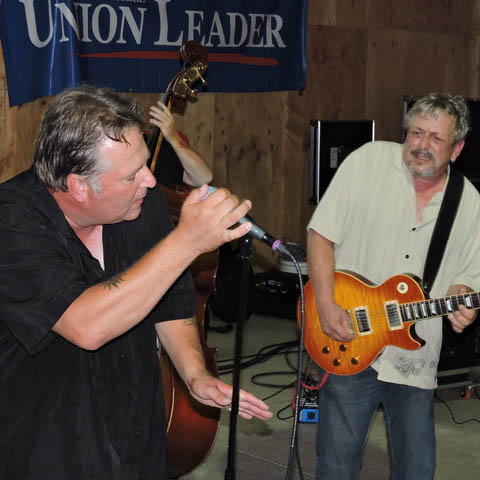

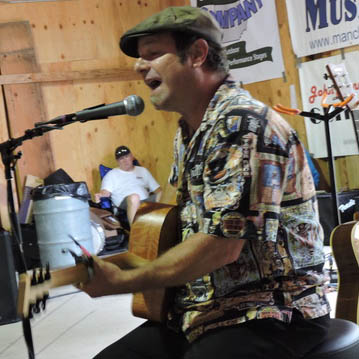
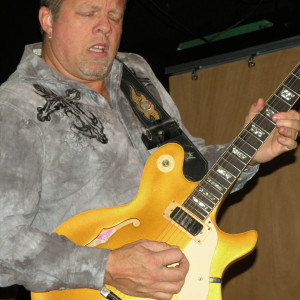
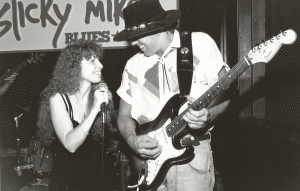

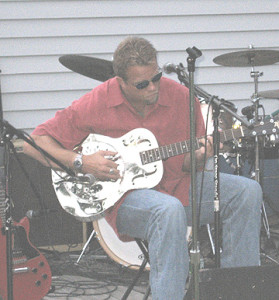
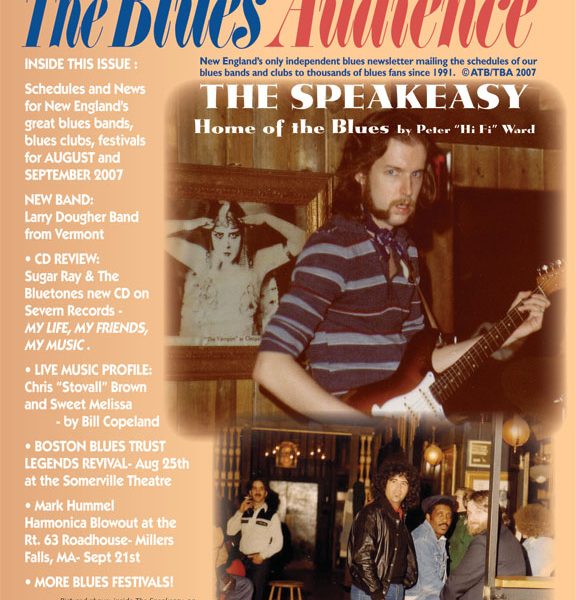
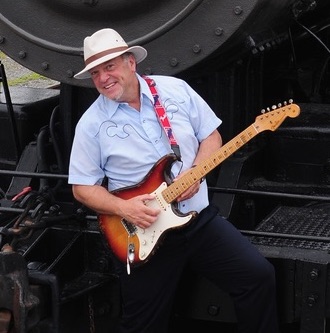
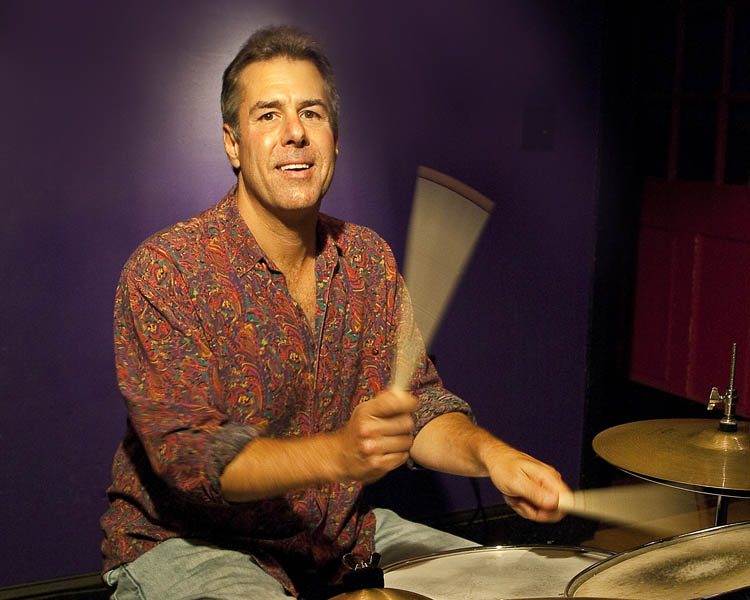
'Chris Fitz Interview by Art Simas' has no comments
Be the first to comment this post!